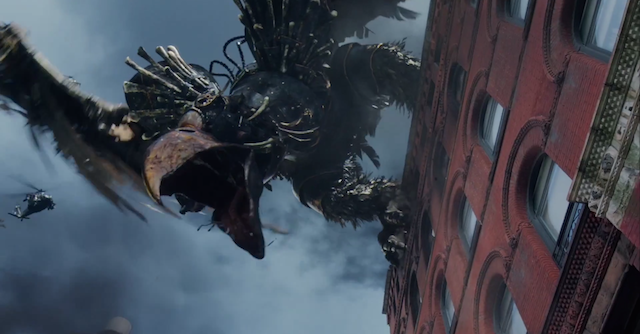“…the impact is mesmerizing.”
Emmanuel Lubezki is starting to do what directors and sometimes screenwriters are known for doing: He’s becoming the distinctive creative voice behind the camera of his movies. This is significant because Lubezki is literally behind the camera, serving as the director of photography – a role that can certainly make or break a movie, but is often considered secondary to the vision of the director. What Lubezki is doing with a camera can’t be ignored. From the ostentatious long takes through battlefields and car chases in Children of Men, to shooting Terrence Malick’s last three visual odysseys, to an Oscar win for his outstanding movement through space in Gravity, Lubezki has established himself as one of the foremost talents in his business. He’s added another feather to his cap, so to speak, with Birdman – a film in which his camera appears to sail through the entire narrative without a single edit.
Birdman – also known by its full title, Birdman or (The Unexpected Virtue of Ignorance) – is not necessarily a thematic match for such grandiose technique. In fact, the movie is essentially small in scope, taking place mostly inside the Broadway theatre that’s hosting a new adaptation of a Raymond Carver short story on its rocky road to opening night. The man who wrote the adaptation also seems a mismatch for the material: Riggan Thomson (Michael Keaton) once wore the cape and the cowl of a superhero named Birdman, through three popular installations of the Hollywood franchise 20 years ago. Now trying to prove he isn’t washed up, and that he has the chops for live theatre, Riggan has gambled heavily on his artistic comeback, bankrolling the play within an inch of mortgaging the properties that were the fruits of his superhero labours. In addition to directing and starring, he’s also got an unstable cast comprised of an ingénue who should have already had her big break (Naomi Watts), the actress he’s currently sleeping with (Andrea Riseborough), and a cocky natural talent who has as much a knack for sabotaging his productions as impressing theatre critics (Edward Norton). One particular critic (Lindsay Duncan) has already served notice that it will be an uphill battle to get her stamp of approval, and to make matters more complicated, Riggan has a recovering addict daughter (Emma Stone) and a betrayed ex-wife (Amy Ryan) hanging around to remind him of his past failures as a father and a husband.
The star of this movie is ostensibly Keaton, and there’s a juicy meta aspect to the story as the actor is, in many ways, a real-life Riggan Thomson. Keaton did two Batman movies in the late 1980s and early 1990s – one fewer than Riggan’s three Birdman movies – and eventually slipped into a similar type of obscurity from which he may only just now be emerging. And Keaton is fantastic in the type of role that should certainly put him on the short list for an Oscar nomination. His performance is a delicious stew of desperation, bruised confidence and possible mental illness that’s hard to forget.
The real star of the movie, though, is Lubezki’s camera. In a device whose impressiveness and fluidity cannot be underestimated, the camera travels through every scene without containing a single overt edit – meaning that not only is all the drama in each scene captured just by the movement of the camera, but the camera even seamlessly transitions into other scenes occurring at other times, merely by traveling down a backstage hallway or getting lost for a moment in a spotlight. You know, consciously, that edits are present, because an actor will sometimes appear twice within the same “shot,” wearing a different costume and ending up somewhere he or she could not otherwise be. But the effect is completely transparent, and the impact is mesmerizing.
While this is, in many ways, Keaton’s and Lubezki’s show, the director certainly warrants a mention for his role in bringing this whole dazzling enterprise – which includes moments of magical realism that are best left discovered by the viewer – to the screen. It’s also a mini comeback for Alejandro González Iñárritu, the director of such films as Amores Perros and Babel, who has sometimes been considered a one-trick pony for his preference for large-scale melodramas with “profoundly” interweaving plots. Enough of Iñárritu’s prior interests are present in these overlapping backstage stories to make Birdman seem like a logical choice for him, but it’s such an ambitious technical step forward that it feels like a rejuvenation of a career that was stalling out. He also gets stalwart performances from his cast, particularly Stone during an epic takedown of her deadbeat dad, Zach Galifianakis playing against type as Riggan’s supportive and emotionally invested agent, and Norton, who hasn’t seemed this dedicated in years, and who contributes the lion’s share of the film’s comedic moments. Iñárritu had also never been thought of as a guy with a sense of humour, which is just one more delightful surprise in a movie full of them.
9/10
For more Reviews, click here. If you’re digging ReelGood, sign up to our mailing list for exclusive content, early reviews and chances to win big!

